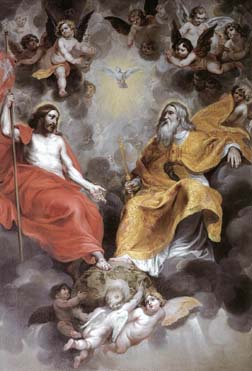The Trinity
Tomorrow is Trinity Sunday, the only day of the church year devoted to a doctrine. Belief in the Trinity is central to the Christian faith and yet for most Christians it is nothing but a vague idea. It has been said that if one can explain the concept of the Trinity plainly so that anyone can understand, he or she is a heretic, we just have to decide what kind.
 The word "Trinity" does not appear in the Bible, though the New Testament does contain some clear references to God: Father, Son and Holy Spirit (including two in our readings for Sunday). The Old Testament refers to God as Wisdom, the Word of God and the Spirit of God in ways that parallel this New Testament use. The word Trinity was itself coined by Tertullian (c. 160-225), not surprising as he created 509 new nouns, 284 adjectives and 161 new verbs in Latin. While not all of those caught on, the word Trinity did as it captured in short form the knowledge of God which had been present for centuries.
The word "Trinity" does not appear in the Bible, though the New Testament does contain some clear references to God: Father, Son and Holy Spirit (including two in our readings for Sunday). The Old Testament refers to God as Wisdom, the Word of God and the Spirit of God in ways that parallel this New Testament use. The word Trinity was itself coined by Tertullian (c. 160-225), not surprising as he created 509 new nouns, 284 adjectives and 161 new verbs in Latin. While not all of those caught on, the word Trinity did as it captured in short form the knowledge of God which had been present for centuries.
Around the year 380, Gregory of Nazianzus wrote about the gradual revelation of the Trinity
Any understanding of the Trinity we have is incomplete. God remains something of a mystery. Yet this fact is no real barrier between us and God. Of course, we can not comprehend God fully. Any God we could fully understand would be more human than divine. But God does reveal something of God's own self to us. We trust that the part of God that has been revealed and that we have experienced is an indication of the character of the whole. While we know God only in part, we trust that revelation of a loving creator who died to redeem us and remains with us along every step of our journeys both physical and spiritual.
 The word "Trinity" does not appear in the Bible, though the New Testament does contain some clear references to God: Father, Son and Holy Spirit (including two in our readings for Sunday). The Old Testament refers to God as Wisdom, the Word of God and the Spirit of God in ways that parallel this New Testament use. The word Trinity was itself coined by Tertullian (c. 160-225), not surprising as he created 509 new nouns, 284 adjectives and 161 new verbs in Latin. While not all of those caught on, the word Trinity did as it captured in short form the knowledge of God which had been present for centuries.
The word "Trinity" does not appear in the Bible, though the New Testament does contain some clear references to God: Father, Son and Holy Spirit (including two in our readings for Sunday). The Old Testament refers to God as Wisdom, the Word of God and the Spirit of God in ways that parallel this New Testament use. The word Trinity was itself coined by Tertullian (c. 160-225), not surprising as he created 509 new nouns, 284 adjectives and 161 new verbs in Latin. While not all of those caught on, the word Trinity did as it captured in short form the knowledge of God which had been present for centuries. Around the year 380, Gregory of Nazianzus wrote about the gradual revelation of the Trinity
The Old Testament preached the Father openly and the Son more obscurely. The New Testament revealed the Son, and hinted at the divinity of the Holy Spirit. Now the Spirit dwells in us, and is revealed more clearly in us.Until Jesus' birth, it was hard to grasp the concept of "God the Son" and until the coming of the Holy Spirit to the church after Jesus' ascension, it was hard for people to grasp the meaning of "the Spirit of God." Yet for the early Christians who were Jewish monotheists, there was no contradiction in preaching of God as a Trinity of persons, Father Son and Holy Spirit. And they saw this understanding of God to be no minor detail, but of central importance to our beginning to comprehend the divine.
Any understanding of the Trinity we have is incomplete. God remains something of a mystery. Yet this fact is no real barrier between us and God. Of course, we can not comprehend God fully. Any God we could fully understand would be more human than divine. But God does reveal something of God's own self to us. We trust that the part of God that has been revealed and that we have experienced is an indication of the character of the whole. While we know God only in part, we trust that revelation of a loving creator who died to redeem us and remains with us along every step of our journeys both physical and spiritual.







0 Comments:
Post a Comment
<< Home